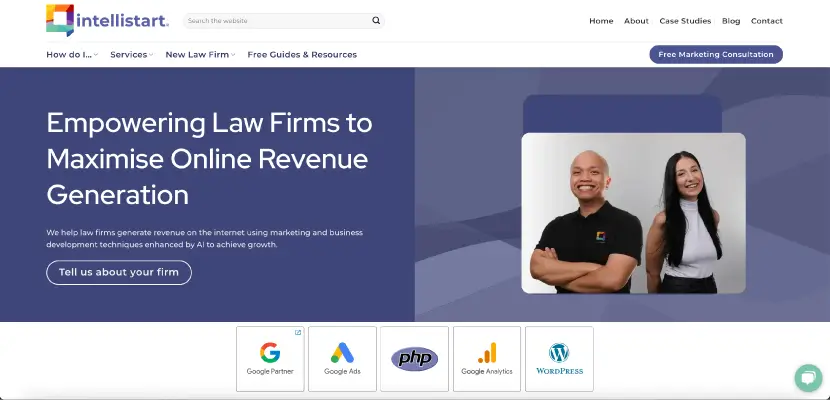Common misconceptions about legal SEO, and what isn’t SEO
In this blog, we aim to shed light on some of the most common misconceptions surrounding SEO, providing clarity and actionable insights for law firm owners navigating the digital landscape.
From outdated practices like ‘keyword stuffing’ to the overlooked importance of technical SEO, we go through some of the nuances of effective optimisation strategies.
Our goal is to equip law firm owners with the knowledge and tools they need to make informed decisions about their online presence.
Here are some of the most common misconceptions about legal SEO and what truly isn’t SEO:
Keyword Stuffing
Many believe that simply cramming keywords into content will improve SEO. However, this belief is outdated and widely recognised as ‘spammy’, since the early to mid-2000s.
In the past, website owners and SEOs would excessively repeat keywords throughout their web pages in an attempt to manipulate search engine rankings. However, as search engines evolved and became more sophisticated in assessing content relevance and quality, they began penalising websites that engaged in keyword stuffing.
Nowadays, keyword stuffing is considered an obsolete tactic and can actually harm your website’s ranking, as search engines penalise for unnatural keyword usage.
Ignoring User Experience (UX)
Some may think that SEO is solely about optimising content for search engines, neglecting the importance of providing a good user experience. In reality, search engines prioritise websites that offer a seamless and intuitive user experience, and meet Core Web Vitals metrics.
If users find your website frustrating, such as due to slow loading times or poor visual stability, search engines may not rank it favourably, regardless of the quantity and quality of your content.
Focusing Solely on Rankings
While achieving high rankings on search engine results pages (SERPs) is important, it’s not the only goal of effective SEO. The ultimate objective is to drive relevant organic traffic and, more importantly, conversions.
Therefore, prioritising rankings and impressions over user engagement and conversions isn’t effective.
Quantity Over Quality in Content Creation
There’s a misconception that churning out a large volume of content is the key to SEO success. However, quality always trumps quantity.
Creating high-quality, relevant, and authoritative content that demonstrates your experience, expertise and addresses user intent is crucial for your website’s success.
Neglecting Technical SEO
Some may overlook the technical aspects of SEO, such as:
- website speed,
- information architecture and navigation,
- mobile-friendliness, and
- structured data markup.
Technical SEO is fundamental, as it ensures that search engines can crawl, index (rank), and understand your website effectively. It’s essential to work with an SEO who can make technical improvements on your website.

How a user sees a website

Representation of how a search engine crawler sees a website
Obsession with Backlink Quantity
While backlinks are important for SEO, focusing solely on acquiring a high volume of backlinks without considering their quality and relevance can be counterproductive.
Quality backlinks from authoritative and relevant sources hold more weight in improving performance of your optimisations.
Ignoring Local SEO
For law firms, local SEO is paramount, as potential clients often search for legal services in their close vicinity. Completely neglecting local SEO tactics such as optimising Google business profiles, local citations, and location-specific keywords can hinder visibility in local search results.
*However, note that creating numerous location pages for your firm, especially if you don’t have offices in those locations, may result in your website being penalised. It’s all about finding the right balance.
Overlooking Analytics and Data Analysis
SEO isn’t just about implementing strategies blindly; it also involves analysing data and making informed decisions based on insights. Your SEO needs to monitor your website’s performance, track key metrics, and adjust strategies accordingly.
If analytics and tracking are not set up on your website, you should question this with your SEO. The most basic source of information on how well your website is doing in Google search rankings are Google’s own tools such as GA4 and Search Engine Console.
Believing SEO can fix a broken website
Believing SEO alone can remedy a flawed website is a common misconception. Unless your SEO provider possesses web design expertise and there is a clear agreement for them to enhance your website’s structure, address technical aspects, and implement general or site-wide improvements to enhance its performance, simply adding more blogs to a deficient website will not guarantee an increase in enquiries for your law firm.
If your website lacks technical soundness and optimisation, supplementing it with optimised blogs will not yield significant results and may lead to unsatisfactory outcomes.
Thinking SEO Is Separate from Overall Marketing Strategy
Some people view SEO as a standalone tactic rather than an integral part of a comprehensive digital marketing strategy. In reality, SEO should align with and complement other marketing efforts such as content marketing, social media, and paid advertising (PPC) to achieve synergistic results.
In terms of PPC, having optimisations on your pages can reduce the costs of your advertising.
At Intellistart Law Firm Marketing, we specialise in legal website design with SEO and PPC advertising services tailored to the unique needs of law firms and legal professionals.
Whether you’re looking to optimise your website for search engines, update your online presence with a professional and user-friendly design accurately reflecting your firm, or launch targeted PPC campaigns to attract qualified enquiries, we can assist you.
With our deep understanding of the legal industry and a commitment to delivering measurable results, we’re dedicated to helping your law firm grow.
Schedule a free consultation with our team today to discuss how we can assist you in detail.
Book a consultation